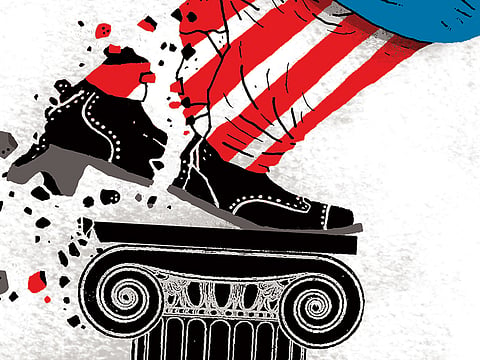Empires and their downfall
The progress of the international response to the Syrian crisis is itself demonstrative of America’s dwindling role on the world stage

In his book The Rise and Fall of the Great Powers, Yale historian, Paul Kennedy draws on historical observation to identify the political and economic conditions that precede the downfall of empires. I first heard about Kennedy’s theory from a very unlikely source — Osama Bin Laden — who predicted that it would apply to the United States in years to come, when I interviewed him in Tora Bora, Afghanistan, in 1996.
At that time, the US enjoyed an unrivalled dominance of the world stage and Bin Laden’s prediction seemed at best slightly eccentric, coming from a man who was living in a cave. Now, however, Kennedy’s words come back to me as I consider Washington’s diminishing stature which, in a great historical irony, is largely the result of its entanglement in the Middle East.
Kennedy’s first condition is lethal economic damage caused by the spiralling costs associated with an expanding military presence around the world. The US maintains bases all over the globe and has been continuously at war in the Middle East for 14 years at a cost of around $6 trillion (Dh22 trillion). Meanwhile, its national debt stands at $18.5 trillion and counting. I would add that the fallout is not only financial: Washington did not win its wars in Afghanistan and Iraq but withdrew, leaving behind unprecedented chaos and a security vacuum rapidly filled by extremists. The same is true of the military intervention in Libya, in which, the US played a leading role. The credibility of the global superpower has been called into question and its national psyche and morale damaged.
America’s troops themselves have been overextended and exhausted — of 500,000 veterans of the wars in Afghanistan and Iraq, 236,000 have suffered from Post Traumatic Stress Disorder. US President Barack Obama’s paralysis over Syria reflects a new timidity in the heart of the superpower and a growing antipathy for further military adventures in the Middle East among the American population.
Carefully planned
The progress of the international response to the Syrian crisis is itself demonstrative of America’s dwindling role on the world stage. It was Russian Foreign Minister, Sergei Lavrov, who insisted that Iran be invited to the negotiating table in Vienna last Friday ... US Secretary of State John Kerry capitulated on that point and will no doubt capitulate too on the matter of Syrian President Bashar Al Assad remaining in power.
Syria opened the door for Russia to re-emerge as a global superpower — paradoxically, it was the collapse of the Soviet Union that precipitated the rise of the neo-con agenda, allowing the US unchallenged hegemony for two decades. Russia’s involvement in Syria has been carefully planned and calculated. Now that Putin is militarily engaged in Syria, he will be in it to win and Daesh (the self-proclaimed Islamic State of Iraq and the Levant) have more to fear from Moscow than Washington.
Close on the heels of Russia, the Chinese are embarking on their first major foreign adventure for decades, working closely with Moscow on the Syrian file, both diplomatically and militarily.
Having failed to take the initiative on Syria, America is now obliged to take the back seat, and where it is defeated, demoralised and exhausted, the Russians and Chinese are full of energy, commitment and conviction.
To return to Kennedy’s thesis: His second condition is the unsustainable economic burden of escalating domestic security costs. Since 9/11, the US has spent $635.9 billion specifically on ‘homeland security’ but a staggering $7.6 trillion on an umbrella ‘defence and homeland security’ budget distributed through a plethora of different departments and organisations.
Kennedy’s third condition sees the emergence of powerful commercial competition from other powers. Here, America is faced with the march of the Brics countries (Brazil, Russia, India, China and South Africa) led by China. By 2030, the Chinese economy will be twice the size of America’s, which is still struggling to recover from the recent recession that left it massively indebted and with zero growth.
They say that rats are quick to abandon a sinking ship and America’s erstwhile allies appear to be turning their backs on Washington. Despite China’s appalling human rights record, Britain’s Prime Minster David Cameron welcomed Chinese President Xi Jinping to London last month and the head of state and his wife were hosted at Buckingham Palace by the Queen. Earlier, Britain had become the first western country to join the Asian Infrastructure Investment Bank (AIIB), to which, the US is vigorously opposed since it is a potent rival of the International Monetary Fund and the World Bank.
The stand-off between London and Washington over the AIIB is the single most significant confrontation between the two allies since the 1944 Bretton Woods conference, when John Maynard Keynes and Deter White argued about the shape future global economy should take. Thirty other western countries, including France and Germany, followed Cameron into the AIIB, causing further consternation in the White House.
If Kennedy’s theory is correct, the US fulfils all the conditions for a declining empire and will eventually implode. If this seems far-fetched, it is sobering to reflect that the once-mighty USSR had followed a similar trajectory, collapsing ten years after the failure of its Afghan project, which drained its coffers and morale. Whatever the future holds, it is certain that Washington’s position as the world’s leading superpower is quietly and methodically being eroded by the emerging giants of the future.
Abdel Bari Atwan is the editor-in-chief of digital newspaper Rai alYoum. He is the author of The Secret History of Al Qaeda; A Country of Words, his memoirs; and Al Qaeda: The Next Generation.



